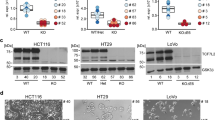Abstract
Inappropriate activation of the Wnt signaling pathway has been repeatedly implicated in the tumorigenesis of colon, liver, and gastric cancers. There is accumulating evidences that transcriptional factor 7 (TCF7; also called T cell factor 1) might also be one of the tumor suppressor genes in the Wnt pathway. We performed PCR-based sequencing analysis of the TCF7 gene in 234 alimentary tract cancers. The TCF7 mutants detected in this study were functionally analyzed after they were generated by a QuickChange site-directed mutagenesis kit. We detected 7 somatic mutations in the TCF7 gene, including 4 missense, 2 frameshift, and one 28-bp deletion. In a yeast two-hybrid assay, most of the mutants showed varying degrees of decreased binding to an amino-terminal enhancer of split (AES), a truncated form of Groucho-related protein lacking WD40 repeats. To determine whether mutant TCF7 proteins had decreased DNA binding, we performed electrophoretic mobility shift assays, and the 2 frameshift mutants were shown to have no DNA binding activity. Furthermore, luciferase reporter assays revealed that TCF7 mutants in the presence of AES failed in the AES-dependent transcriptional repression of the reporter gene. In addition, human embryonic kidney 293 cells transfected with TCF7 mutants expressed high levels of cyclin D1, up to 6 times more than cells transfected with wild-type TCF7. Therefore, the TCF7 mutations detected in this study seem to be “loss-of-function mutations“ caused by loss of TCF7 repressor activity through decreased binding to Groucho-related protein and/or DNA, thereby contributing to neoplastic transformation by causing accumulation of cylin D1.
Similar content being viewed by others
References
Tetsu, O. & McCormick, F. Beta-catenin regulates expression of cyclin D1 in colon carcinoma cells. Nature 398:422–426 (1999).
Hurlstone, A. & Clevers, H. T-cell factors: turn-ons and turn-offs. EMBO J 21:2303–2311 (2002).
Satoh, S. et al. AXIN1 mutations in hepatocellular carcinomas, and growth suppression in cancer cells by virus-mediated transfer of AXIN1. Nat Genet 24:245–250 (2000).
Klaus, A. & Birchmeier, W. Wnt signalling and its impact on development and cancer. Nat Rev Cancer 8:387–398 (2008).
Park, W. S. et al. Frequent somatic mutations of the beta-catenin gene in intestinal-type gastric cancer. Cancer Res 59:4257–4260 (1999).
Kinzler, K. W. & Vogelstein, B. Lessons from hereditary colorectal cancer. Cell 87:159–170 (1996).
Wang, S. S. et al. Alterations of the PPP2R1B gene in human lung and colon cancer. Science 282:284–287 (1998).
He, T. C. et al. Identification of c-MYC as a target of the APC pathway. Science 281:1509–1512 (1998).
Chen, G., Fernandez, J., Mische, S. & Courey, A. J. A functional interaction between the histone deacety-lase Rpd3 and the corepressor groucho in Drosophila development. Genes Dev 13:2218–2230 (1999).
van de Wetering, M., Castrop, J., Korinek, V. & Clevers, H. Extensive alternative splicing and dual promoter usage generate Tcf-1 protein isoforms with differential transcription control properties. Mol Cell Biol 16:745–752 (1996).
Waterman, M. L. Lymphoid enhancer factor/T cell factor expression in colorectal cancer. Cancer Metastasis Rev 23:41–52 (2004).
Roose, J. et al. Synergy between tumor suppressor APC and the beta-catenin-Tcf4 target Tcf1. Science 285:1923–1926 (1999).
Najdi, R. et al. A Wnt kinase network alters nuclear localization of TCF-1 in colon cancer. Oncogene 28: 4133–4146 (2009).
Veien, E. S., Grierson, M. J., Saund, R. S. & Dorsky, R. I. Expression pattern of zebrafish tcf7 suggests unexplored domains of Wnt/beta-catenin activity. Dev Dyn 233:233–239 (2005).
Daniels, D. L. & Weis, W. I. Beta-catenin directly displaces Groucho/TLE repressors from Tcf/Lef in Wnt-mediated transcription activation. Nat Struct Mol Biol 12:364–371 (2005).
Brantjes, H., Roose, J., van De Wetering, M. & Clevers, H. All Tcf HMG box transcription factors interact with Groucho-related co-repressors. Nucleic Acids Res 29:1410–1419 (2001).
Arce, L., Pate, K. T. & Waterman, M. L. Groucho binds two conserved regions of LEF-1 for HDAC-dependent repression. BMC Cancer 9:159 (2009).
Roose, J. et al. The Xenopus Wnt effector XTcf-3 interacts with Groucho-related transcriptional repressors. Nature 395:608–612 (1998).
Lee, J. Y. et al. A simple, precise and economical microdissection technique for analysis of genomic DNA from archival tissue sections. Virchows Arch 433:305–309 (1998).
van de Wetering, M. et al. The human T cell transcription factor-1 gene. Structure, localization, and promoter characterization. J Biol Chem 267:8530–8536 (1992).
Tetsuka, T. et al. Inhibition of nuclear factor-kappaB-mediated transcription by association with the aminoterminal enhancer of split, a Groucho-related protein lacking WD40 repeats. J Biol Chem 275:4383–4390 (2000).
Author information
Authors and Affiliations
Corresponding author
Additional information
These authors contributed equally to this work
Rights and permissions
About this article
Cite this article
Jung, K.H., Yoon, K.J., Song, J.H. et al. Loss-of-function mutations in the Transcription Factor 7 (T cell factor-1) gene in hepatogastrointestinal cancers. Mol. Cell. Toxicol. 6, 271–278 (2010). https://doi.org/10.1007/s13273-010-0037-y
Received:
Accepted:
Published:
Issue Date:
DOI: https://doi.org/10.1007/s13273-010-0037-y




